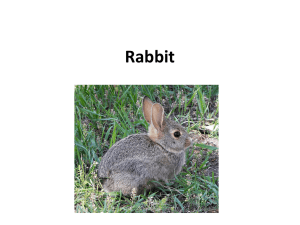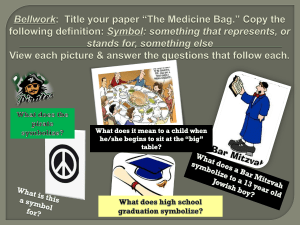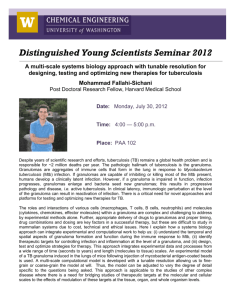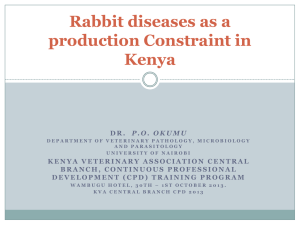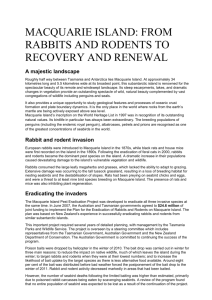Case Study- Germ Theory
advertisement
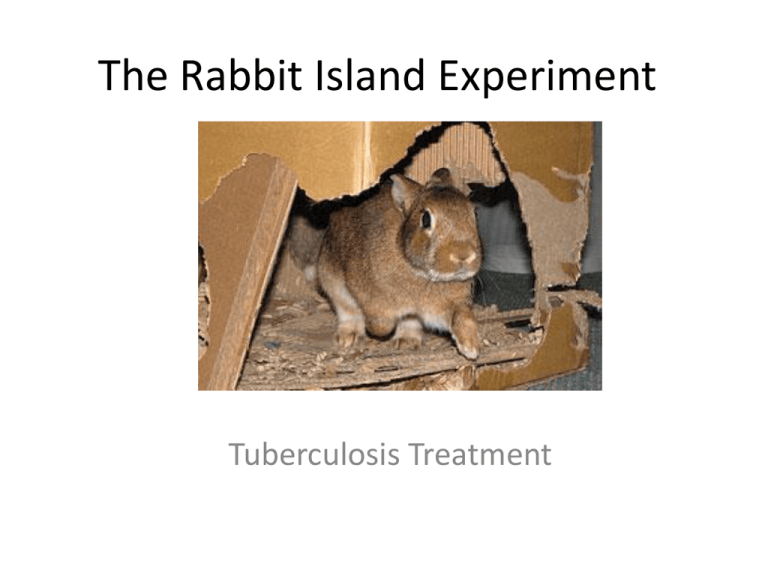
The Rabbit Island Experiment Tuberculosis Treatment Tuberculosis • Tuberculosis is an infectious disease that has plagued humankind for most or all of its history. • Evidence of the disease has been found in mummified Egyptian and Peruvian remains from as early as 4000 years ago. • The pathogen, Mycobacterium tuberculosis (MTb), was identified in 1874 by Robert Koch, a Prussian scientist who is frequently hailed as the father of infectious disease and the germ theory of infection. • MTb is a relatively slow-growing bacteria. Its waxy outer coat provides a physical protection against immune defense • Only about one in three people exposed to the bacteria actually develop tuberculosis, due to differences in genetic susceptibility/resistance genes of the host, and probably due to differences in actual dose received • Recovery, progression, and death rate vary from individual to individual. • The bacteria is introduced most typically through inhalation of microbes • Port of entry is typically the lungs, where infection may in some cases be resolved by the host immune system, but in other cases there is difficulty in slowing or stopping the doubling of the invading microbe inside host macrophages. The Rabbit Island Experiment • Please Read The Rabbit Island Experiment • Highlight any important information as you go • Circle any new or unknown vocabulary Common Belief • TB was caused by “bad blood” (genetics) • Or was caused by dank conditions such as obnoxious smells and “bad air” Discovery! • In 1882, Robert Koch discovered that TB was caused by the bacterium Mycobacterium tuberculosis • He could grow it in the lab, and infect animals • This lead to the “Germ Theory” of infection which stated that infectious diseases were caused by germs The Rabbit Island Experiment • Dr. Trudeau gets TB after caring for his sick brother • He knew that a large number of people who get TB die • In NY where he lived, most people came home to inadequate housing, food, ventilation, sanitation, and little to no relaxation time He’s dying….Oh wait…. • He moved to the wilderness of upstate NY • After a while he got better! • He began to think of the cause and cure for TB Dr. Trudeau’s Experiments • Was intrigued by the correlation between healthy outdoor lifestyle and decided to develop an experiment to test his hypothesis Experiments • 1. Infected rabbits + cramped conditions/no light/no fresh air/no exercise/not enough food • 2. Healthy rabbits+ cramped conditions/no light/no fresh air/no exercise/not enough food/damp • 3. Infected rabbits+ sunshine/fresh/air/plenty of food/exercise Results • Group 1: 20% survival • Group 2: 100% survival • Group 3: 80% survival What do these results tell us? Homework Assignment 1. Describe the results of the experiment. 2. Use your results to write an overall conclusion to the Rabbit Island Experiment 3. Develop an answer to each of Dr. Trudeau’s questions 4. Do his results support the germ theory of infection? Why or why not? 5. What does the data suggest might be good environmental conditions for TB patients? 6. What might be the effect of crowding on effective exposure rate of individual animals to the MTb bacteria? 7. What dependent variable in the Rabbit Island Experiment. Also, list all of the ID variables you can think of in the experiment. 8. Select any one of the ID variables you have listed and design an experiment similar to Dr. Trudeau’s. State your experimental question (What are you trying to find out)? Formulate a hypothesis, how will you manipulate your treatment groups? Then imagine possible outcomes. 9. What would you have changed about the Rabbit Island Experiment? 10. If you were the mayor of NYC in the 1890s, and knew of Dr. Trudeau’s experiments, what sort of public policies might you try to enact in order to combat the public health menace? What obstacles might you encounter
